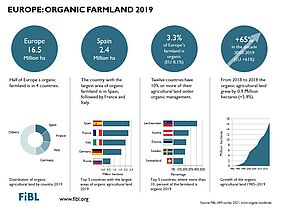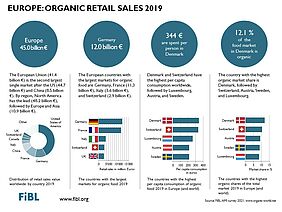In 2019, the European organic sector experienced substantial growth in terms of area, producers and markets.
In Europe, 16.5 million hectares of farmland were organic in 2019 (European Union: 14.6 million hectares). With almost 2.4 million hectares, Spain continues to be the country with the largest organic area in Europe, followed by France (2.2 million hectares), and Italy (2.0 million hectares).
Organic farmland increased by almost one million hectares
The organic farmland increased by over 0.9 million hectares in Europe and by over 0.8 million hectares in the European Union, representing an increase of 5.9 percent each. Growth was slower than in 2018 but higher than in the first years of the past decade. France reported almost 206’000 hectares more than in 2018, Ukraine almost 159’000 hectares more, and Spain over 108’000 hectares more.
Liechtenstein is the country with the highest organic share of the total farmland in the world
In 2019, organic farmland in Europe constituted 3.3 percent of the total agricultural land and 8.1 percent in the European Union. In Europe (and globally), Liechtenstein had the highest organic share of all farmland (41.0 percent) followed by Austria, the country in the European Union with the highest organic share (26.1 percent). Twelve European countries reported that at least 10 percent of their farmland is organic.
Organic producers on the rise
There were almost 430’000 organic producers in Europe and almost 343'000 in the European Union. The largest numbers were in Turkey (almost 74’545) and Italy (70’561). The number of producers grew by 2.8 percent in Europe and by 5.0 percent in the European Union.
Continued growth of processors and importers
There were almost 82’000 processors in Europe and over 78’000 in the European Union. Over 6’500 importers were counted in Europe and almost 5‘800 in the European Union. The country with the largest number of processors was Italy (nearly 22‘000), while Germany had the most importers (more than 1’800).
Retail sales reach €45.0 billion
Retail sales in Europe were valued at €45.0 billion (€41.4 billion in the European Union). The largest market was Germany (€12.0 billion). The European Union represents the second largest single market for organic products in the world after the United States (€44.7 billion).
Steady growth of retail sales in 2019
The European market recorded a growth rate of 8.0 percent. Among the key markets, the highest growth was observed in France (13.4 percent). In the decade 2010-2019, the European and European Union markets' value has more than doubled.
European consumers spend more on organic food
In Europe, consumers spent €56 on organic food per person annually (European Union: €84). Per capita, consumer spending on organic food has doubled in the last decade. In 2019, Danish and Swiss consumers spent the most money on organic food (€344 and €338 per capita, respectively).
Denmark has the highest organic market share in the world
Globally, European countries account for the highest shares of organic food sales as a percentage of their respective food markets. Denmark has the highest organic food sales share worldwide, with 12.1 percent in 2019, followed by Switzerland with a share of 10.4 percent and Austria with 9.3 percent.
Quotes
According to Helga Willer, responsible for data collection at FiBL, the numbers for 2019 show a promising growth of the organic area and market. "However, the organic area will have to continue to grow in the coming years in order to reach the European Commission’s goal of 25 percent organically farmed land by 2030."
Eduardo Cuoco, Director at IFOAM Organics Europe, continued: "This data shows the European organic market’s potential to reach the objective of 25 percent organic land by 2030 put forward in the EU Biodiversity and Farm to Fork strategies. To reach this target the organic sector needs political support at all levels. This includes a good regulatory framework, adequate support under the CAP – with clear support for organic in the national strategic action plans – and a powerful European Organic Action Plan with concrete actions supporting conversion, market development and capacity building of the European organic sector. We will work closely with all the stakeholders to develop tools to measure and support organic growth."
Diana Schaack, a market analyst at AMI, adds: "We are already looking forward to the consolidated market data for 2020. Last year the organic market in many countries exhibited accelerated growth due to the pandemic. If this trend sustains, production and processing have to keep pace. The Farm to Fork strategy of the European Union can support this development with respective measures."
FiBL and AMI conducted the survey on organic farming in Europe. The FiBL data collection was carried out in the framework of the global survey on organic farming supported by the Swiss State Secretariat for Economic Affairs (SECO), the International Trade Centre (ITC), the Coop Sustainability Fund, NürnbergMesse and IFOAM – Organics International.
Further information
Contacts
For questions about organic data:
- Dr. Helga Willer, FiBL, Ackerstrasse 113, 5070 Frick, Switzerland
- Diana Schaack, AMI – Agrarmarkt Informations-Gesellschaft mbH, Dreizehnmorgenweg 10, 53175 Bonn, Germany
+49 228 33805-0, diana.schaack(at)ami-informiert.de, www.ami-informiert.de
For the European organic movement’s position on reaching 25% organic land in Europe by 2030:
- Eva Berckmans, IFOAM Organics Europe
Rue du Commerce 124-6, 1000 Brüssel, Belgium
+32 2 416 52 32, eva.berckmans(at)organicseurope.bio
Download, infographics and online databases
- organic-world.net: "Download The World of Organic Agriculture 2021"
- organic-world.net: Infographics
- statistics.fibl.org: FiBL statistics on organic agriculture worldwide
Links
- fibl.org: Website of FiBL, the Research Institute of Organic Agriculture
- ami-informiert.de: Website of AMI, the Agricultural Market Information Company
- organicseurope.bio: Website of the European umbrella organisation for organic food and farming
- biofach.de: Website of BIOFACH
Programme of the session "The European market for organic food" at the BIOFACH eSPECIAL 2021
Wednesday, 17 February 2021, 5 to 6 pm, Livestream 5
- Dr. Susanne Padel, Thünen-Institut, Germany, Moderator
- Dr. Helga Willer, Research Institute of Organic Agriculture FiBL, Switzerland
- Dorian Fléchet, Agence Bio, France
- Lee Holdstock, Soil Association Ltd., UK
- Diana Schaack, Agrarmarkt Informations-Gesellschaft mbH (AMI), Germany
- Prof. Dr. Raffaele Zanoli, Università Politecnica delle Marche, Italy
More information:
biofach.fibl.org: FiBL BIOFACH website





